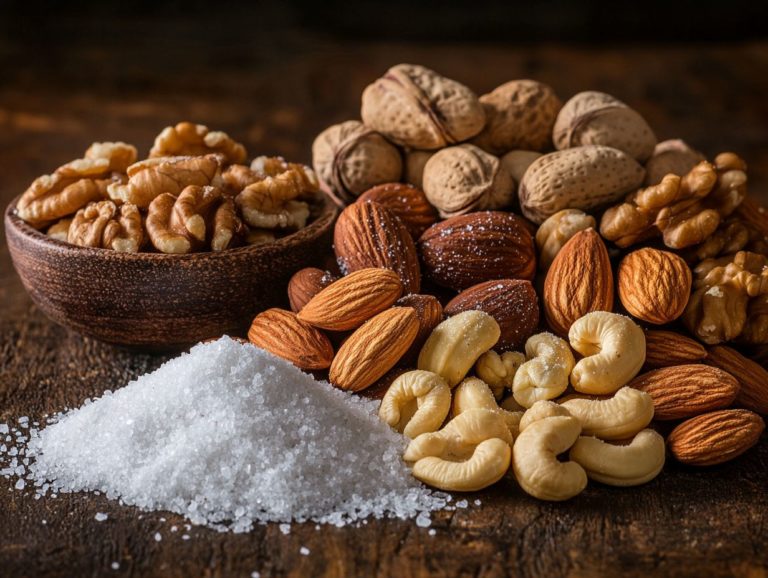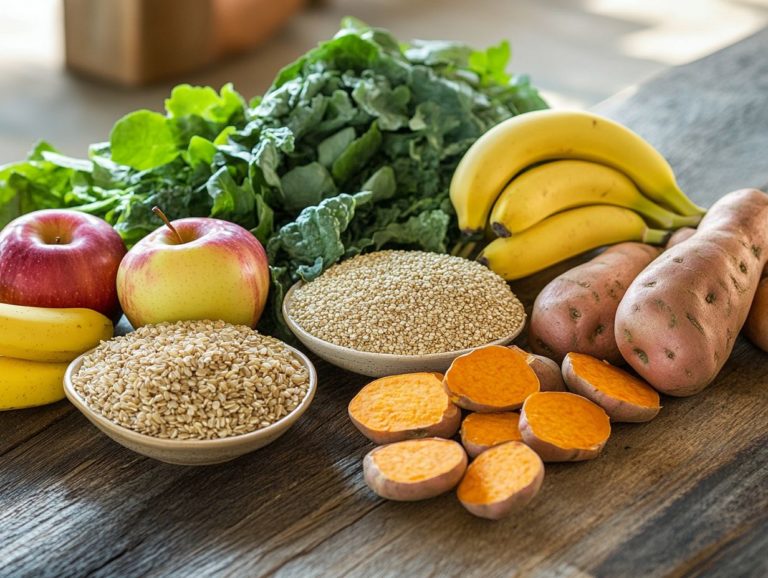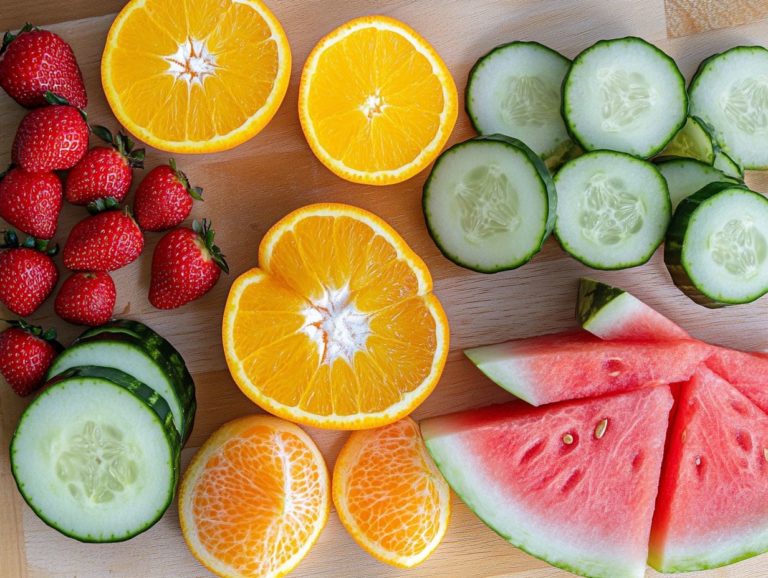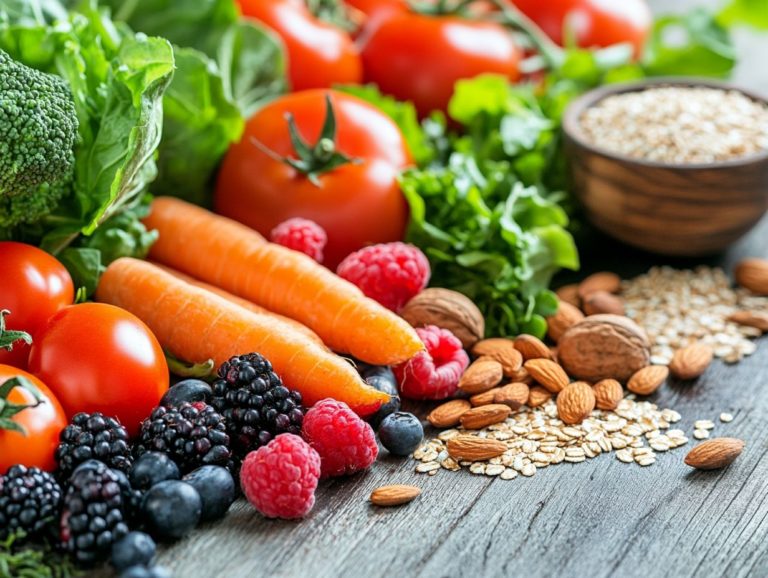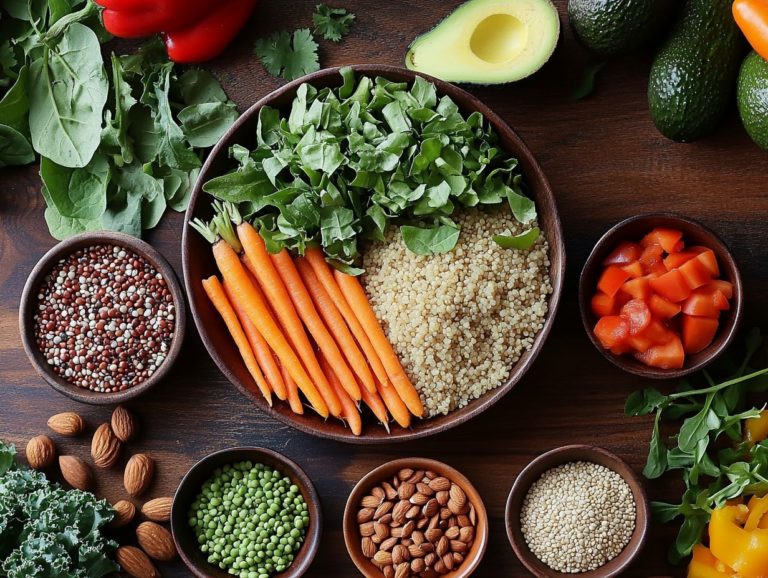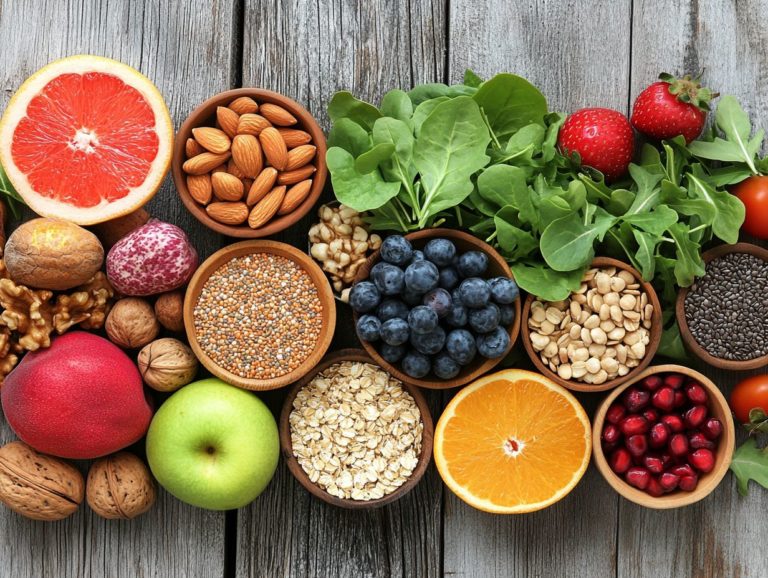Understanding the Food Sources of Vitamin C
Vitamin C is a powerhouse nutrient that plays a crucial role in maintaining your health and well-being. Its benefits are extensive, from boosting your immune system to promoting radiant skin.
This article delves into the importance of vitamin C, highlighting its key health advantages while identifying fruits and vegetables rich in this essential vitamin. You ll also find practical tips for incorporating more vitamin C into your diet, guidance on when to consider supplements, and a collection of delicious recipes to try.
Dive into the amazing world of vitamin C and transform your health today!
Contents
Key Takeaways:
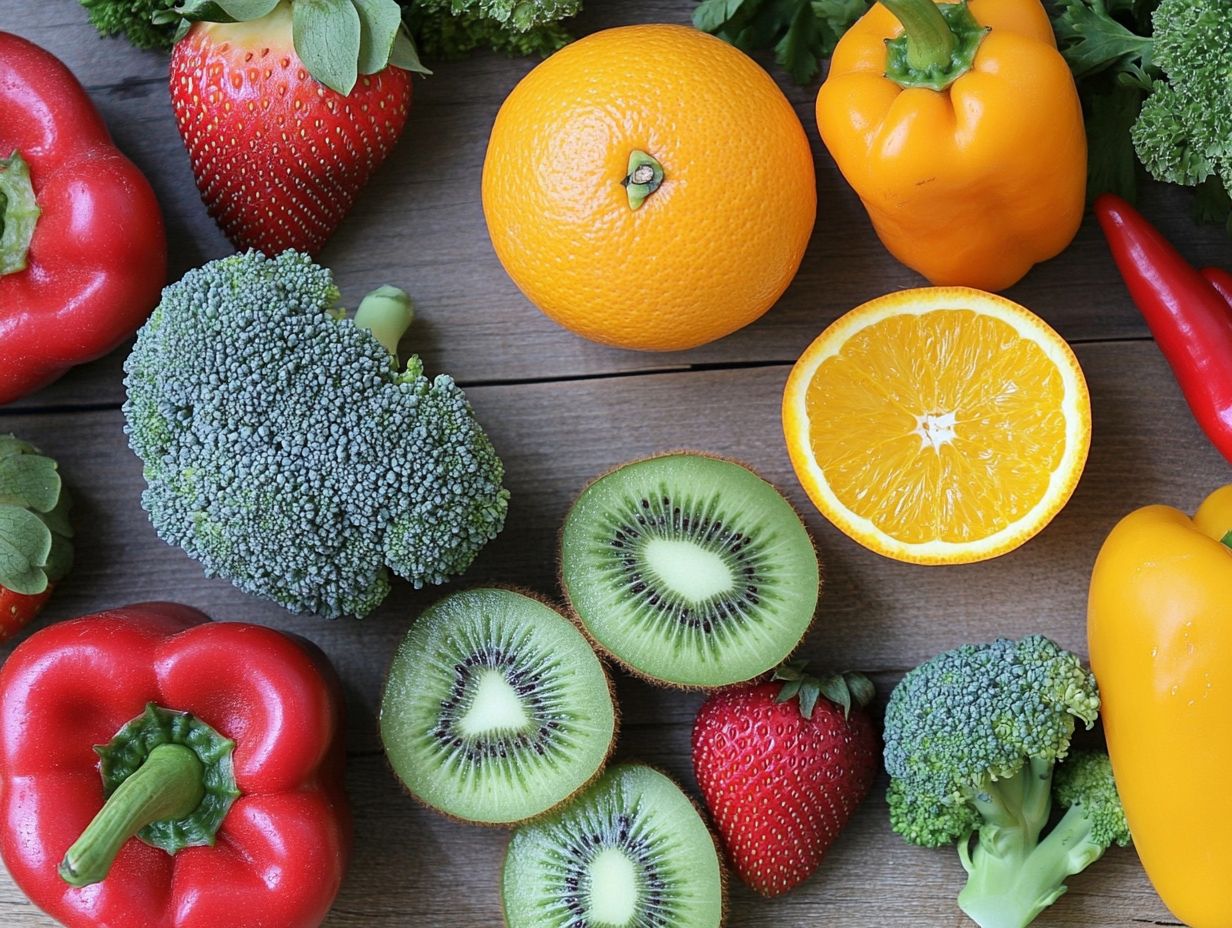
- Vitamin C is an essential nutrient that plays a vital role in overall health and well-being.
- Incorporating a variety of fruits and vegetables into your diet is the best way to ensure an adequate intake of vitamin C.
- While supplements can be beneficial, it’s important to consult with a healthcare professional before adding them to your routine.
What is Vitamin C?
Vitamin C, the scientific name for vitamin C, is an essential nutrient celebrated for its ability to fight harmful substances. It helps maintain healthy skin, supports your immune system, and helps heal wounds.
Famous figures like Linus Pauling popularized vitamin C. It plays a crucial role in the proper functioning of blood vessels and collagen production.
Since it’s a water-soluble vitamin, you need to include it regularly in your diet, as your body cannot produce it on its own. Failing to get enough vitamin C can lead to scurvy, a condition marked by fatigue and skin issues that are best avoided.
Benefits of Vitamin C
Vitamin C is packed with health benefits you ll love! It significantly boosts your immune system, reduces the risk of chronic diseases, and helps stave off age-related conditions.
Research indicates that getting enough vitamin C can lower your chances of developing cancer, cardiovascular issues, and even everyday ailments like the common cold. As a powerful antioxidant, vitamin C protects your cells from oxidative stress, reinforcing your long-term health.
Key Health Benefits
The key health benefits of vitamin C are impressive. It acts as a powerful antioxidant, shielding your body from free radicals while bolstering your immune system and aiding in wound healing.
This essential nutrient is vital for collagen production, which is the protein that keeps your skin elastic and helps wounds heal effectively. Research indicates that when you increase your vitamin C intake, you may notice improved skin health fewer wrinkles and better hydration can be delightful side effects.
Studies show that getting enough vitamin C can make colds shorter and less severe, emphasizing its crucial role in immune defense.
You can easily enhance your diet with delicious sources of this vitamin, like oranges, strawberries, and bell peppers, making them fantastic choices for boosting your overall health and well-being.
Food Sources of Vitamin C
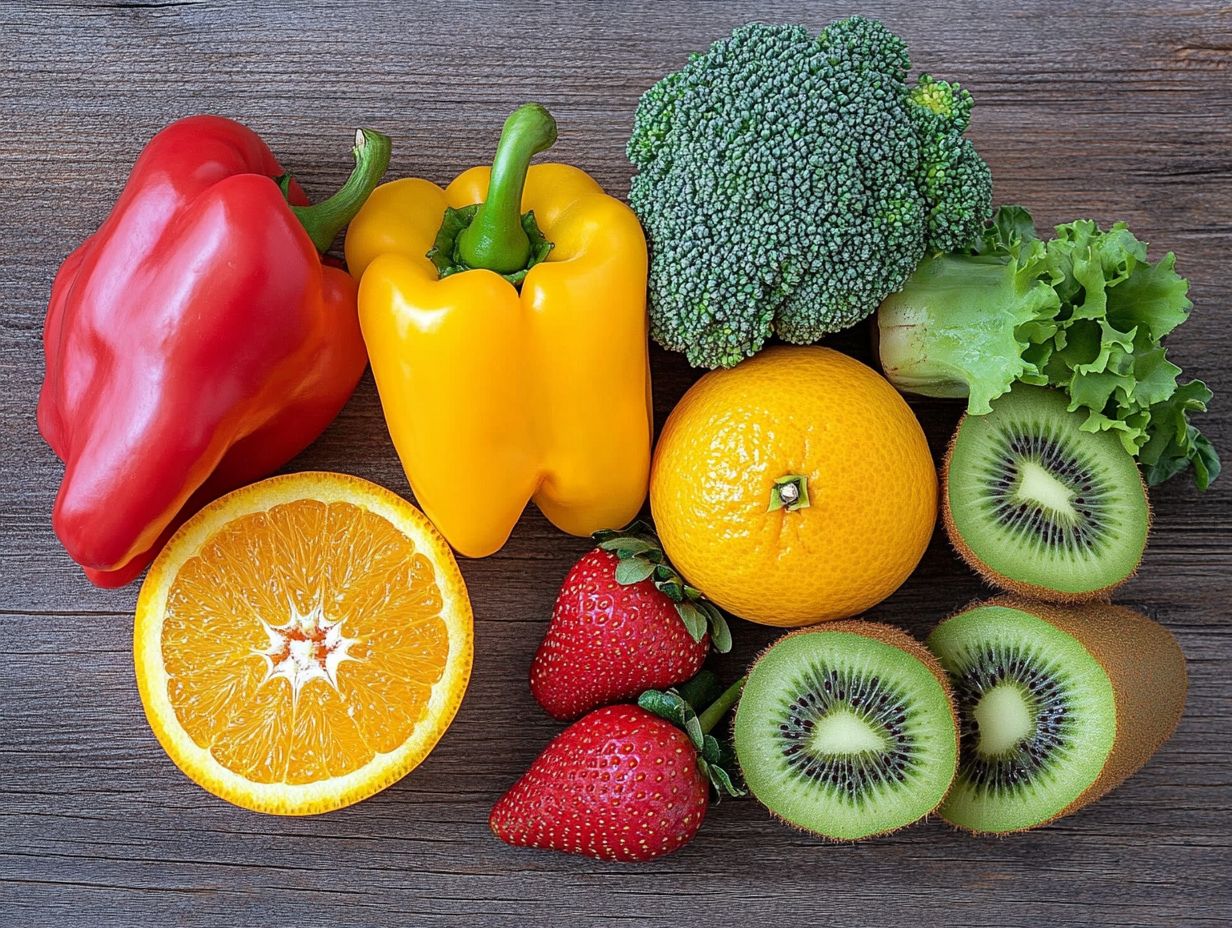
You ll discover vitamin C in a plethora of dietary sources, with citrus fruits reigning supreme due to their impressive concentrations of this essential nutrient. Beyond oranges and lemons, fruits like blackcurrants, strawberries, and guava also pack a powerful vitamin C punch.
Don t overlook vegetables like broccoli and Brussels sprouts; they re equally rich in this vital nutrient. These foods not only help you meet your vitamin C requirements but also offer a host of additional health benefits through their diverse nutrient profiles.
Intriguingly, the Kakadu plum stands out as one of the richest sources of vitamin C available today, making it a remarkable addition to your diet.
Fruits and Vegetables High in Vitamin C
Fruits and vegetables rich in Vitamin C offer a delightful array of options that can be woven into your daily meals. Citrus fruits, blackcurrants, strawberries, broccoli, and Brussels sprouts are your go-to allies.
These nutrient-dense foods do more than just boost your immune health. They also provide a treasure trove of antioxidants that help your body fight damage from free radicals. Citrus fruits like oranges and grapefruits can deliver over 70 mg of Vitamin C per medium fruit, making them a tasty, healthful choice.
Blackcurrants are the real star, packing an impressive 180 mg per cup perfect for anyone eager to amp up their Vitamin C intake. Strawberries, with around 85 mg in a single cup, are a delightful addition to salads or desserts.
If you’re leaning toward vegetables, a cup of cooked broccoli supplies about 81 mg, while Brussels sprouts contribute roughly 75 mg per serving. Incorporating these vibrant fruits and vegetables into your meals enhances your skin health and promotes iron absorption, boosting your overall vitality.
Other Sources of Vitamin C
You can also explore other sources of Vitamin C, such as the Kakadu plum and Vitamin C supplements, which will definitely help you meet your daily requirements. These alternatives can be particularly valuable if you find it challenging to get enough Vitamin C from your regular diet.
Superfoods like acerola cherries and camu camu are packed with this essential nutrient. They can easily be blended into smoothies or taken in powder form. If fresh produce isn t always readily available, dietary supplements offer a convenient way to boost your Vitamin C intake.
By exploring these various sources, you ensure that your nutritional needs are met especially during increased stress or illness.
How to Incorporate Vitamin C into Your Diet
Incorporating Vitamin C into your diet can be delightful and effortless, thanks to a wealth of recipes and dietary guidelines designed to help you meet your daily intake.
To enhance absorption, include a vibrant array of fruits and vegetables in your meals. Fresh juices or salads showcasing vitamin C-rich ingredients are great options.
By creating dishes that balance various sources of Vitamin C, you contribute to your nutritional needs and overall health.
Tips and Recipes
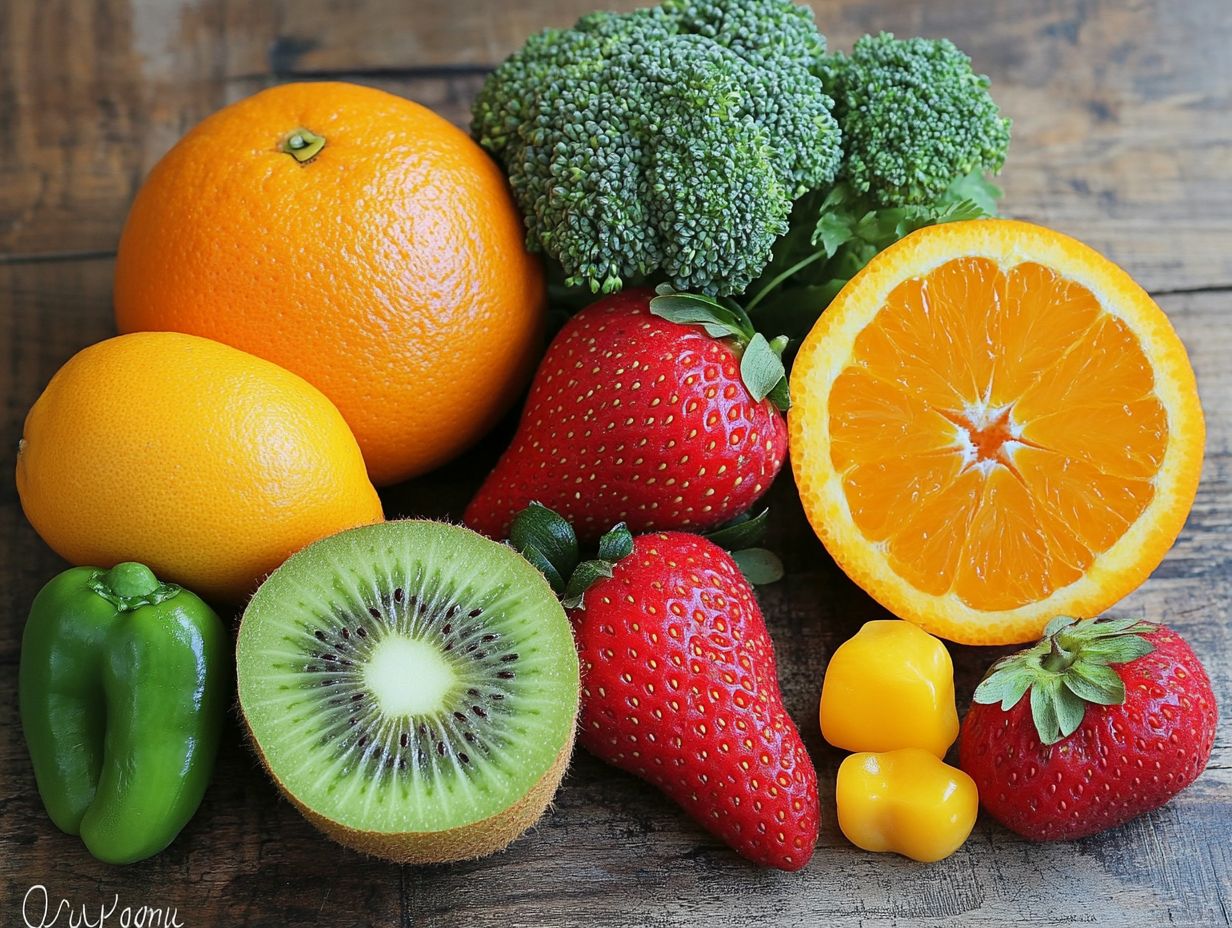
To maximize your Vitamin C intake, explore recipes that highlight fresh, unprocessed ingredients rich in this vital nutrient. Let fruits and vegetables take center stage in your culinary creations.
Incorporate vibrant options like bell peppers, broccoli, and citrus fruits to elevate the flavor of your meals. This ensures that you’re reaping the full benefits of every bite.
When preparing your dishes, focus on cooking methods such as steaming or saut ing at low temperatures. These techniques preserve both the color and vitality of your produce, locking in essential nutrients.
For a quick and delightful summer salad, try a vibrant mix with juicy diced tomatoes and crisp kale topped with a generous squeeze of lemon juice. This simple salad provides a refreshing burst of flavor and significantly boosts your Vitamin C content, making each forkful both nutritious and satisfying.
Supplementing with Vitamin C
Supplementing with Vitamin C can be an excellent choice for those who find it challenging to meet their daily requirements through diet alone. By selecting the right approach, you can enhance your Vitamin C absorption and overall well-being.
While a variety of Vitamin C supplements are available, it’s crucial to pay attention to the appropriate dosage. Megadoses aren t always necessary and could lead to unwanted side effects.
Making informed decisions helps you reap the full benefits of this essential nutrient.
Start incorporating these vitamin C-rich foods into your diet and feel the difference in your health today!
Do you have your own tips or recipes for incorporating Vitamin C into your meals? Share them below!
When and How to Take Supplements
When considering vitamin C supplements, understanding the best times and methods for consumption is essential. This ensures maximum absorption and helps meet your daily requirements.
Taking vitamin C at strategic times can significantly enhance its benefits. It s often recommended to consume it in the morning or alongside meals. Food can aid in its uptake.
The common dosage for adults typically ranges from 500 to 1,000 mg per day. However, it’s advisable to consult with a healthcare provider for personalized recommendations tailored to your specific health needs.
Pair vitamin C with fruits high in bioflavonoids, such as berries or citrus. This combination can boost its effectiveness. Incorporating these nutrient-rich foods is an excellent strategy for improving your overall health.
Potential Risks and Considerations
While vitamin C is vital for health, it s important to know the risks associated with excessive intake. A deficiency can lead to serious conditions like scurvy, which manifests through symptoms like fatigue and skin issues.
Taking megadoses of vitamin C can introduce significant risks, including gastrointestinal disturbances like diarrhea and nausea. It may also interfere with the absorption of other essential nutrients.
Finding the right balance is key. Aim to get vitamin C from a well-rounded diet rich in fruits and vegetables, such as oranges, strawberries, and bell peppers. Consider supplements carefully, especially if you re not getting enough from your diet.
Maintaining consistent vitamin C levels is essential for immune health and overall well-being. Inadequate intake can hinder wound healing and increase susceptibility to infections.
Frequently Asked Questions
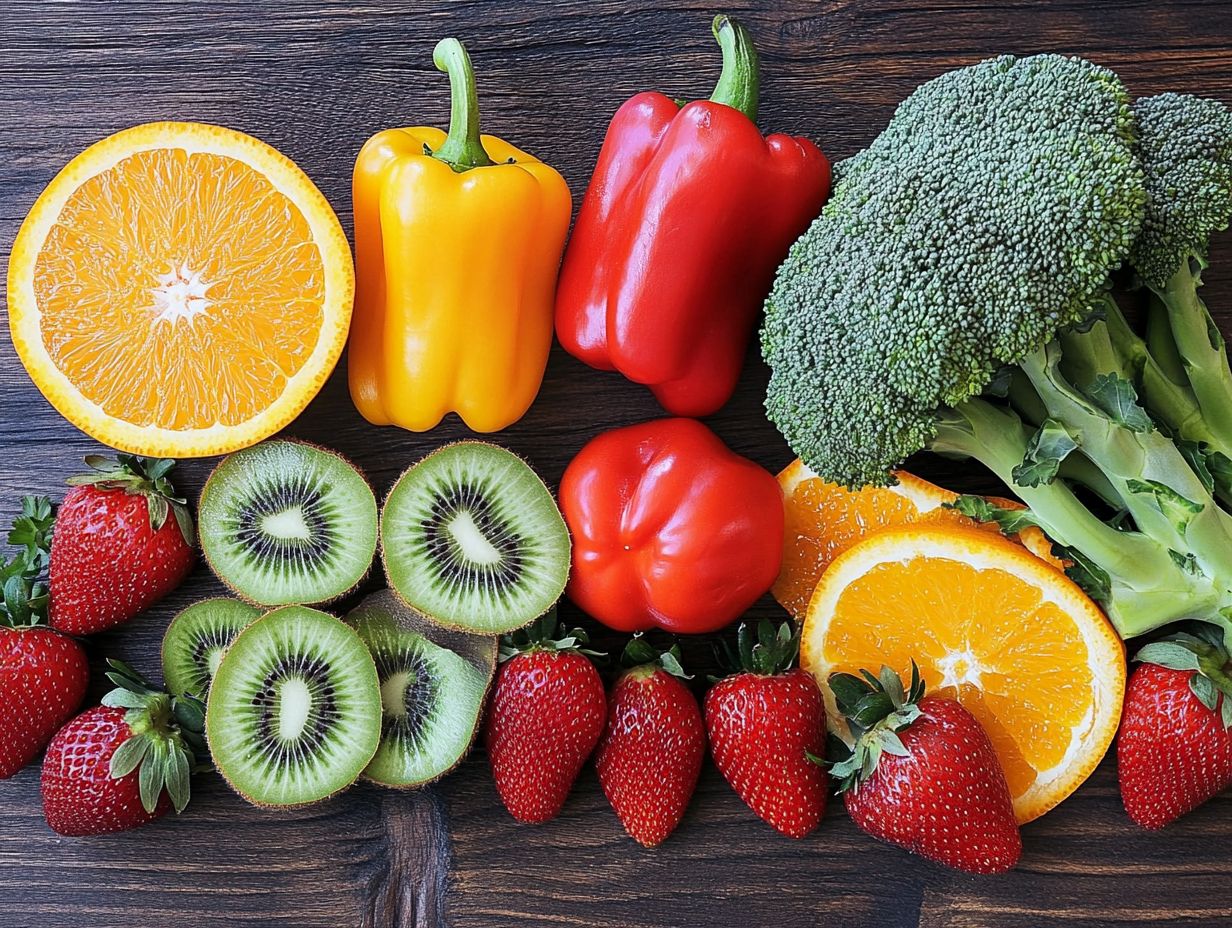
Why You Need Vitamin C for Your Health
Vitamin C, also known as ascorbic acid, is a water-soluble vitamin that plays a vital role in maintaining our health. It helps our body absorb iron, supports a healthy immune system, and aids in the production of collagen, a protein essential for skin, bones, and connective tissue.
What are the Best Food Sources of Vitamin C?
The best food sources of vitamin C are fruits and vegetables. Citrus fruits like oranges, lemons, and grapefruit are particularly rich. Dark leafy greens, bell peppers, strawberries, and kiwi also provide significant amounts. Other sources include broccoli, tomatoes, papaya, and Brussels sprouts.
Can I Get Enough Vitamin C from Supplements Alone?
While supplements can be a convenient source of vitamin C, it’s always best to obtain nutrients from whole foods. Whole foods contain other beneficial nutrients and antioxidants that work together with vitamin C for maximum absorption and health benefits.
How Much Vitamin C Do I Need Per Day?
The recommended daily allowance (RDA) for vitamin C varies by age, gender, and overall health. For adults, the RDA is 75-90 mg per day. Pregnant individuals or those with chronic illnesses may need more.
Can I Consume Too Much Vitamin C?
Yes, it is possible to consume too much vitamin C, though it is rare. The recommended upper limit is 2,000 mg per day, which is about the equivalent of 20 oranges. Too much vitamin C can lead to digestive issues such as diarrhea, nausea, and stomach cramps.
What Happens If I Don’t Get Enough Vitamin C?
A deficiency in vitamin C can lead to health issues such as scurvy, characterized by fatigue, joint pain, and bleeding gums. It can also weaken your immune system, making you more susceptible to illnesses and infections.
Check your vitamin C levels and consult a healthcare professional if you have concerns about your intake!

